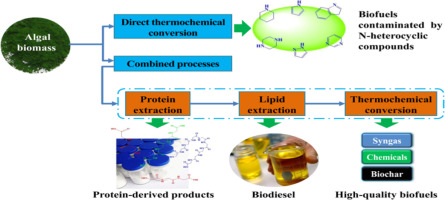Algal Research ( IF 4.6 ) Pub Date : 2020-02-05 , DOI: 10.1016/j.algal.2020.101819 Liangliang Fan , Haili Zhang , Jingjing Li , Yunpu Wang , Lijian Leng , Jun Li , Yanhong Yao , Qian Lu , Wenqiao Yuan , Wenguang Zhou

|
Thermochemical processes, including gasification, liquefaction, and pyrolysis, are promising technologies for algal conversion. Gasification is effective to convert algal biomass into fuel gases while liquefaction and pyrolysis are favorable for the production of bio-oil with low molecular weight and biocrude with high energy density, respectively. To understand the role of algal components (proteins, lipids, and carbohydrates) on thermochemical conversion processes, this paper reviews the properties of biofuels from the thermochemical conversion of algal components and their model compounds. The characteristic fingerprints of algal components differ from one another. Consequently, the thermochemical conversion of the total algal biomass results in heterogeneity of the biofuels. The unfavorable nitrogenous compound production also leads to resource and energy losses, which are the critical bottleneck of algal biorefinery. As such, this review tackles some combined processes. The combination of the hydrothermal liquefaction of algal biomass and the hydrothermal gasification of an aqueous fraction shows potential for applications that improve fuel gas production. Lipid extraction combined with thermochemical residue conversion contributes to an increase in total oil yield. Protein extraction combined with thermochemical residue conversion decreases the risk of nitrogenous compound contamination in bio-oil and increases the recovery of value-added protein-derived products. Protein and lipid extraction before thermochemical conversion should be further explored to maximize the exploitation of multiple value-added products from algal biomass.
中文翻译:

通过基于热化学转化的组合工艺将藻类生物精炼厂转变为增值产品:回顾
包括气化,液化和热解在内的热化学过程是藻类转化的有前途的技术。气化有效地将藻类生物质转化为燃料气体,而液化和热解分别有利于生产低分子量的生物油和高能量密度的生物原油。为了了解藻类成分(蛋白质,脂质和碳水化合物)在热化学转化过程中的作用,本文从藻类成分及其模型化合物的热化学转化中回顾了生物燃料的特性。藻类成分的特征指纹彼此不同。因此,总藻类生物质的热化学转化导致生物燃料的异质性。含氮化合物的不利生产还导致资源和能源损失,这是藻类生物精炼厂的关键瓶颈。因此,本次审查解决了一些组合过程。藻类生物质的水热液化和含水馏分的水热气化相结合,显示出可用于改善燃料气体生产的应用潜力。脂质提取与热化学残渣转化相结合有助于提高总油收率。蛋白质提取与热化学残留物转化相结合,降低了生物油中含氮化合物污染的风险,并提高了高附加值蛋白质衍生产品的回收率。













































 京公网安备 11010802027423号
京公网安备 11010802027423号